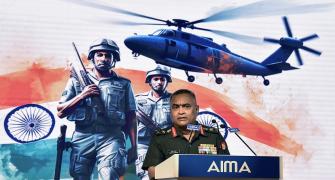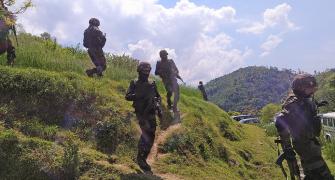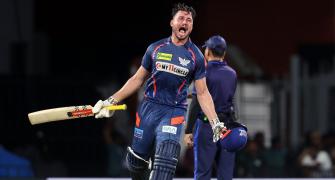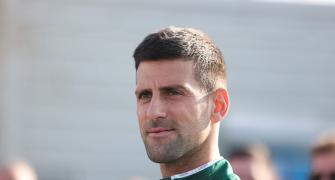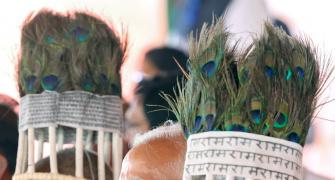Briefed on India's angst over the ambiguity on the access to Lashkar operative and 26/11 conspirator David Headley and also the perceived US indifference to India's role in Afghanistan, US President Barack Obama has assured Prime Minister Manmohan Singh that he was "fully supportive" of India's request for access to Headley and "fully appreciated" and "recognized the enormous sacrifices" India has made in helping "stabilize" Afghanistan.
But beyond these assurances of support on the access to Headley front and appreciation of India's "continuing contributions to Afghanistan's development," there were no tangible assurances that Headley would be made available anytime soon for questioning by India authorities or would invite New Delhi to be more involved in playing a policy role in Afghanistan.
Foreign Secretary Nirupama Rao, who sat in on the nearly 50-minute mini bilateral summit between Obama and Dr Singh, briefing reporters on the meeting said that in the context of discussing burgeoning Indo-US counterterrorism, Obama had said "that they were working through their legal system on the issue of provision of access to David Coleman Headley. He (Obama) was fully supportive of our request for provision of such access."
But later when senior administration officials were asked by rediff.com if this meant that something tangible on access to Headley by Indian authorities were imminent, they reiterated what they had said during the run-up to this mini bilateral summit in that "it's all in the legal realm now" and would depend on law enforcement how this is worked out and was "the prerogative" of Attorney General Eric Holder.
That it was not "within the jurisdiction of either the White House or the State Department" to give the green light to such access beyond simply says that they supported India's request for provision of such access.
This was reiterated publicly by Deputy National Security Adviser for Strategic Communications Ben Rhodes, who, in a White House briefing of the Obama-Singh meeting and other bilaterals the US president had, asked about access to Headley by India, said, "I couldn't tell you with specificity But I do know that this is a matter that our justice department is responsible for and that the Attorney General is responsible for."
"So, they would have the best information as to what the current status is," he said, and then went on to give the usual spiel that "I will say that we cooperate very closely with our Indian friends on issues of counterterrorism. So, we addressed these kinds of issues in that spirit of cooperation."
Rao and senior administration sources noted when the discussion on counter-terrorism and Indo-US cooperation in this regard had come up, Dr Singh with steely determination had warned of the dangers to the region of cross-border terrorism exported from Pakistani territory.
"How this menace is tackled would determine the future of the South Asia region," Dr Singh told Obama and in this context, besides the Headley case had also referred to the "tremendous rise of infiltration across the Line of Control."
Dr Singh had also specifically mentioned the burgeoning threat of the Lashkar-e-Tayiba and Jamaat-ud-Dawa chief Hafiz Saeed, considered one of the architects of the 26/11 terror attacks in Mumbai and Harkat-ul-Jihad Islamiya chief Ilyas Kahsmiri having free rein in Pakistan to hold public meetings in Pakistan and incite continued terror against India.
He also complained bitterly to Obama that "unfortunately there was no will on the part of the Pakistan to punish those responsible for the terrorist crimes in Mumbai of 26/11," and had declared that this was where "the partnership of India and the United States could make the difference."
Obama had empathized with India's concerns about the worldwide threat of groups like the LeT and had assured Dr Singh that "the United States is sensitive to these concerns," and was "engaging Pakistan on these issues".
He also said that "the US would be sensitive" to India's concerns about the massive American security largesse provided to Pakistan, which in the past also while ostensibly meant to counter insurgency and militancy had instead been diverted for use against India.
Rao said that in terms of how the US would be sensitive to India's concerns on this score, Obama had assured Singh that this security assistance to Pakistan "would be monitored and kept under observation, keeping India's concerns in mind."
As expected, there had been mutual satisfaction expressed over the conclusion of the reprocessing negotiations between India and the US with regard to moving one step closer to operationalising the Indo-US civilian nuclear deal, but reflecting the concern of American business and industry, Obama had referred to the pending civil nuclear liability bill and expressed the hope that "this could be concluded as expeditiously as possible."
As he had during Dr Singh's state visit to Washington, DC in November -- the first by a foreign leader in his administration -- Obama during the initial conversation had declared that there was "no country in the world where the opportunities for a strong strategic partnership are greater and more important to him personally or to the United States than that with India".
And in this regard, he had spoken of how much his administration was "looking forward to the strategic dialogue" between New Delhi and Washington to take place on June 3 in DC led by External Affairs Minister S M Krishna and Secretary of State Hillary Clinton.
Dr Singh, reiterating sentiments he had expressed during his state visit and his toast during the state dinner had spoken on how much he and the people of India were "looking forward to the visit of President Obama and Mrs Obama later this year," and that Obama had "caught the imagination of millions around the world, including the people of India who were anxious to see him soon in our country".
Rao said that Obama had informed the prime minister that his visit to India was "definitely planned this year."
"We don't have dates as yet, but we are working on that both governments are working on that," Rao added.
Besides Clinton, the US team flanking the President comprised White House Chief of Staff Ramn Emanuel, Energy Secretary Steven Chu, National Security Adviser, Retd. Gen. Jime Jones, Special Adviser to the President on Nonproliferation and Arms Control at the White House Gary Samore, Under Secretary of State for Political Affairs William Burns, and Assistant Secretary of State for South Asian Affairs Robert Blake.
Dr Singh was flanked by National Security Adviser Shiv Shankar Menon, Rao, Ambassador Meera Shankar, and Deputy Chief of Mission at the Indian Embassy in Washington, DC, Arun Kumar Singh.



